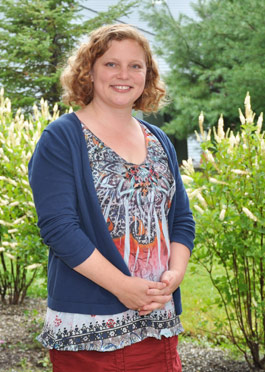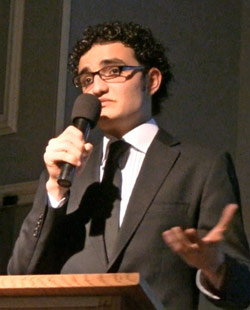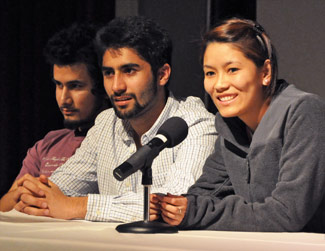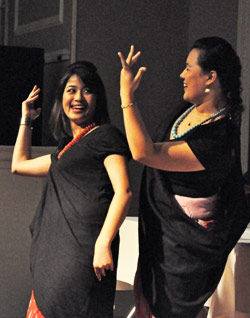
An Inteview with Associate Dean of International and Diversity Programs Pamela Serota Cote
Pamela Serota Cote, who joined the college in August 2010, holds a B.A. in French from Oberlin College, an M.Ed. in counseling and student services from University of Massachusetts at Amherst, and an Ed.D. in organization and leadership from the University of San Francisco. She previously managed international programs, recruitment and admissions, and student service programs for the University of California's Hastings College of the Law, Mills College and New School University.
How would you describe your new position and its goals and areas of responsibilities?
It's a bit of a work in progress because part of my job is to help create what the mission will be for our international and diversity programs here. It involves working with existing programs such as the Progressive Scholars program to address the college's diversity goals, as well as with our international programs, such as Global Explorations.
I'm looking at how we can internationalize the entire campus. That involves working with faculty in different departments to see if the curriculum in their classes can be enhanced to bring in more of a global perspective, or assisting faculty with developing short-term trips abroad in conjunction with classes they teach, such as the pilot course we've introduced with Professor Brandy Gibbs-Riley who will lead a group of students on a 10-day trip to Germany in May to study German design and culture. I hope other faculty members will want to jump on board and bring students to other parts of the world to see what they've been studying and discussing in class. It's going to enrich the learning experience, and I think it's an exciting direction for us.
I'm also working on campus events and activities to raise awareness of global issues. A good example is International Education Week, a program I organized in November. This event is sponsored by the U.S. Departments of Education and State and is celebrated on college campuses across the country. It's meant to be a collaborative celebration that involves the campus community in different aspects of international education. This fall we had faculty and student panels discussing various international issues such as the Middle East conflict and Tibet; students speaking about their home countries and study abroad; an international film series; a travel photography exhibition; ethnic cuisines highlighted in the dining hall; and a game for students to win coverage of their passport fee in order to encourage more students to apply for their passport so they are able to travel outside the United States.
There are other programs and events on campus during other times of the year that have an international theme, and I think that's great and they should continue to happen, but the idea for International Education Week is to bring concentrated attention to global education for an entire week, and that is very helpful in order to raise awareness in the community.
I dream of creating a global citizen certificate program in which students could choose to enroll. Other schools have done similar things for students with an interest in global affairs. There would be a variety of courses covering global competencies that students would be required to take, including a foreign language, study abroad, and some kind of service-learning experience. It's something I would love to see here eventually.

How do students benefit from these kinds of international programs and experiences?
In this day and age we're such an interdependent world. People need to have an understanding of other cultures and languages, and know how to work with people of different backgrounds. No matter what field students go into, it's going to serve them well in terms of advancing their careers if they can show that they can move between cultures and have that kind of sophisticated awareness and knowledge.
I don't think it benefits only those students who picture themselves working in another country. Right here in New England, students are going to see that having global competency will help them in their careers. The United States needs more citizens with that kind of background. Linking to the world is one of the college's strategic themes, and I see my position as helping us move toward that goal.
Are you involved in international recruitment and services?
I have a background in international recruitment but that's not currently part of my portfolio. Having international students here is another part of exposing our students to other cultures. So it's not just sending them overseas, but we should also have a diverse, dynamic campus, and part of that is bringing international students here so they're learning side by side in the classroom and getting to be friends.
Cindy Benson and David Elliott in International Student Services are the ones working directly with the international students, welcoming and supporting them here. Cindy is also advisor to the Cross Cultural Club and coordinates events such as the International Festival in the spring. I'm more focused on strategic plans for internationalization, bringing events and programs to campus, working with faculty, and providing leadership to support offices like International Student Services.
Something I'm interested in seeing if we could develop here is an international house, which many colleges have, where international and domestic students live together in an internationally-themed house. It could remain open during breaks and over the summer so that students who can't afford to go back home would have a place to stay all year. It could energize people, be a hub of activity and programs, and be a wonderful addition to this campus.
So I'm thinking about the big picture and long-term plans. How can we raise funds to help initiatives that would benefit the international students here, and the work that Cindy and David are doing? That's how I currently see my role.

How are you involved in developing and supporting diversity programs on campus?
The diversity piece is another big part of my job, and the Progressive Scholars program is my primary focus in that area. This year we welcomed the third class of scholars. The program was created but there hasn't been a central person to oversee the program or advise the students. I'm playing that role right now, but ideally others will help me to put on workshops, take students to off-campus programs and be more available on the ground.
We now have 47 students in the program, so the recruitment side has been successful. Where we have not done as well is in working with the students once they get here and ensuring the program is meaningful for both the scholars and for others on campus. We're not benefitting as much as we could be by having more diverse students here and must now go a step further to create thoughtful programming that enhances inclusivity.
Last fall Professor Joe Carroll and I took a group of Progressive Scholars to a student leadership conference called “Best in Class” at University of Massachusetts/Amherst. I'm trying to involve more faculty with the program and find ways for them to work with the students. I'm also trying to find emergent leaders within the Progressive Scholar program who can help me make this a stronger program. I would like to offer the Scholars more opportunities for leadership on campus, and provide workshops to help them develop these skills.
Diversity, however, goes way beyond the Progressive Scholar Program. We have students of color who are not Progressive Scholars and we have Progressive Scholars who are not students of color; we have international students representing many ethnicities, linguistic communities, and religions; we have LGBT students; students with disabilities; and we have faculty and staff who also represent various diverse communities - diversity is about our entire community, and needs to be acknowledged, embraced and embedded meaningfully into all that we do and all that we are as a community.
I have recently formed a Faculty Diversity Committee, which I believe will be a positive step in supporting underrepresented students on campus. I am also working on establishing a Student Diversity Council to bring students together to work on programs and events that will help make this campus more aware and inclusive.
I'd also like to initiate diversity training workshops to ensure that the campus is a safe, welcoming, and nurturing place for people of all backgrounds. I would like to see diversity stickers around campus – similar to what Safe Zones produced for the LGBT community - for those who participate in these workshops.
I see my job as touching many lives and offices on campus. If I work with Human Resources to find ways to bring more diverse faculty and staff here, that will have a positive effect on students. They will see role models and mentors on campus, and it sends a message that diversity matters to this institution. It's important for students to see that. People need to be able to look around and see that this college cares about diversity on all levels.
There are a lot of different directions this office can go in, and this first year is about connecting to the college, understanding who everyone is, what everyone does. It's a real assessment year as well as beginning to take some steps forward toward enhancing global and multicultural understanding.

What is your background in higher education?
I've worked in higher education administration for about 12 years. I started out at the Institute of International Education in New York City and had more of an international focus to my career. The institute administers Fulbright programs and gave me my break in international education, but I really wanted to work in a college setting rather than a non-profit organization. So then I went to the New School University as an international student advisor, and then moved to Student Services and Programming, where I got more involved in diversity issues.
There were problems on that campus with students of color feeling alienated, leading to a lot of other issues and incidents. It was divisive for the community but I was able to bring things around; it was a really meaningful time in my career. We ended up having some very positive change on campus. Wherever I go I try to bring people together and create collaborative opportunities for greater understanding.
After that I moved to Mills College, a women's college in Oakland, Calif., and worked in the graduate school with admissions, international students and student programming. While there I discovered that the graduate programs all worked in isolation and didn't communicate. We had these interesting graduate programs in the creative disciplines such as studio art, music, and creative writing, but nobody ever talked to each other or worked together, and I thought, This is crazy! I knew we could do something exciting on campus if we worked more collaboratively, and that it would filter down to the undergraduate programs once it got started.
So I ended up creating this collaborative events initiative, and we put on some fabulous programs. For Halloween, the art students decorated the college museum with these dark, eerie paintings, and the music students played spooky music, and the creative writing students read scary stories. We opened it up to everyone, and it was this fun, alternative way of celebrating Halloween. We did the same thing on Valentine's Day; the art students created erotic, romantic images, the music students played sexy, romantic music, and the writing students read love poems. So these events brought all the departments together in a new, creative way. I'd like to think that that is my signature way of working, wherever I go: creatively and collaboratively.
What brought you to Colby-Sawyer College and this newly created position?
After working for seven years at a law school, I wanted to return to the undergraduate level because college is such a critical time in students' development. I personally gained so much in my undergraduate college years, and I feel it's a better setting for me, the work I want to do and the difference I want to make. After I completed my doctorate, I thought it was the right time to look for another opportunity and set my sites on a small undergraduate college setting.
I also like being at the beginning of things; it's exciting to have an influence on the direction of a program or a place. This position is new and the college is looking to me for that input; so that was another very appealing part of the position. My hope is that this will be an office that interacts across the campus. I don't want people to think that international programs are here in this one corner of campus or that diversity is just something Pamela does. I am hoping that as we move forward, we will all start thinking about these issues, personally owning the value of diversity, and contributing to creating a really dynamic community here.


